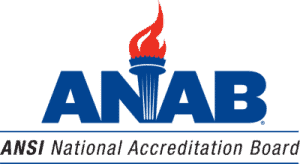Fundamentals of Internal Auditing

Internal audits are required by many ISO certification and accreditation standards, such as ISO 9001 and ISO/IEC 17025. This stresses the importance of a vast range of professionals to understand how to conduct internal audits. An ANAB training course, Fundamentals of Internal Auditing, is designed as the first step in understanding the internal audit process.
How Do Management Systems Address Internal Audits?
Management system requirements related to internal auditing are similar across many of the ISO standards. This is due to the mandatory and recommended requirements of Common Elements in ISO/CASCO Standards released by ISO/CASCO as QS-CAS-PROC/33, which states,
“It is recognized that in some fields specific to management system requirements already exists, such as ISO 9001 for quality management systems…ISO/CASCO working groups shall not write management system requirements that contradict these established requirements where they exist.”
Who Needs to Conduct Internal Audits?
Certified and accredited organizations must plan, establish, implement and maintain an audit program. This includes defining the frequency, methods, responsibilities, planning and reporting processes related to internal audits.
ISO 19011, Guidelines for auditing management systems, provides additional details on building an internal audit program, including planning and conducting audits and competence and evaluation of auditors. The Fundamentals of Internal Auditing course covers key concepts from this international standard. However, to better understand the ISO 19011 standard, it is recommended that attendees also register for the self-paced training course, Overview of ISO 19011:2018, to gain a robust knowledge of internal auditing and developing internal audit programs.
Internal audits are considered first-party audits. They are internally performed by personnel of the organization or by assigned contractors. Internal audits are performed to determine conformance to specified requirements, or in other words, fulfillment of requirements by the organization performing the internal audit. Internal audits confirm if an organization’s management system is effectively implemented.
The Fundamentals of Internal Auditing participants include laboratory managers, technical staff, and auditors who want or need to learn audit practices.
What Are the Fundamentals of Internal Auditing?
ANAB’s self-paced training course, Fundamentals of Internal Auditing, provides participants with the knowledge needed to plan and implement internal audits. It also helps give them an understanding of the internal audit process and communication skills associated with internal auditing, such as effective interviewing and writing nonconformities.
Those who undergo this training will:
- Learn key concepts from ISO 19011:2018
- Understand the internal audit process
- Develop techniques for effective interviewing and listening
- Understand the management and technical issues related to internal auditing
This self-paced training course is presented as self-paced, web-based seminar through an online platform, Mindflash.
What Is the Purpose of an Internal Audit?
Internal audits serve many purposes. From an ISO perspective, internal audits provide information on whether the management system conforms to the applicable standard requirements and to the organization’s own requirements. Organizations perform internal audits to meet the internal audit requirement within the applicable standard, but that should not be the only reason. Internal audits should be used to provide objective insight into the operations of the organization to improve operational efficiency, enhance opportunities, mitigate risks, and ensure that policies and procedures are effectively implemented and maintained.
What Is the Main Goal of an Internal Audit?
The main goal of an internal audit should be as a continual improvement activity for the organization. Internal audits are a tool to drive operational improvements throughout the organization by identifying areas of weakness and opportunities for improvement. Along with other management system tools, such as management review and corrective action, organizations can further their continual improvement efforts on an ongoing basis.
You can register for Fundamentals of Internal Auditing here. ANAB also conducts additional training courses to help you fortify your internal auditing knowledge, including Internal Auditing to ISO/IEC 17025, Internal Audit Intensive Workshop, and Overview of ISO 19011:2018.
Learn More About Internal Auditing
ANAB has many further resources on internal audits, including the free webinars The Importance of Soft Skills for Assessors and Auditors, Improving your Internal Auditing Skills, Internal Audit vs Gap Analysis
You can also refer to our past blog posts The Importance of Internal Audits and Management Reviews, Auditing in the Digital Age, Assessment and Audit Performance Techniques, and Improving your Internal Auditing Skills






